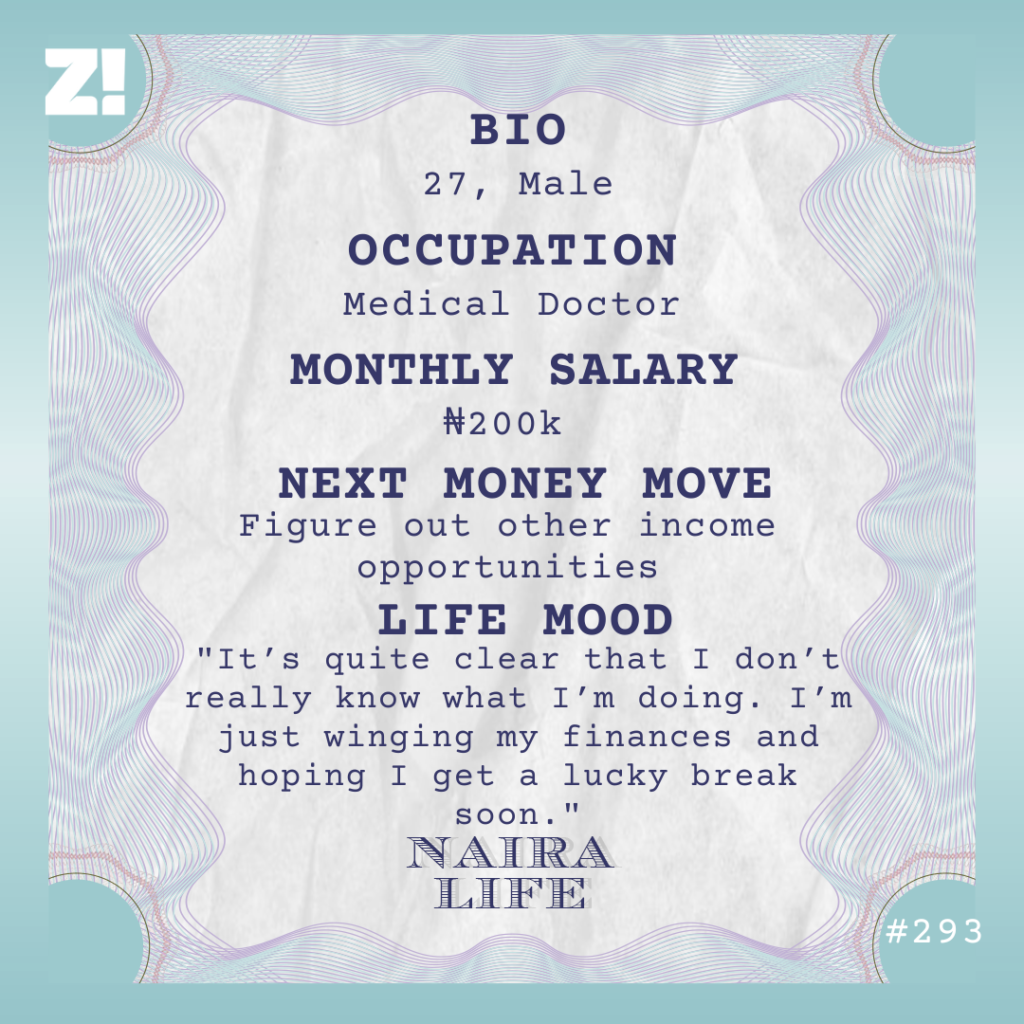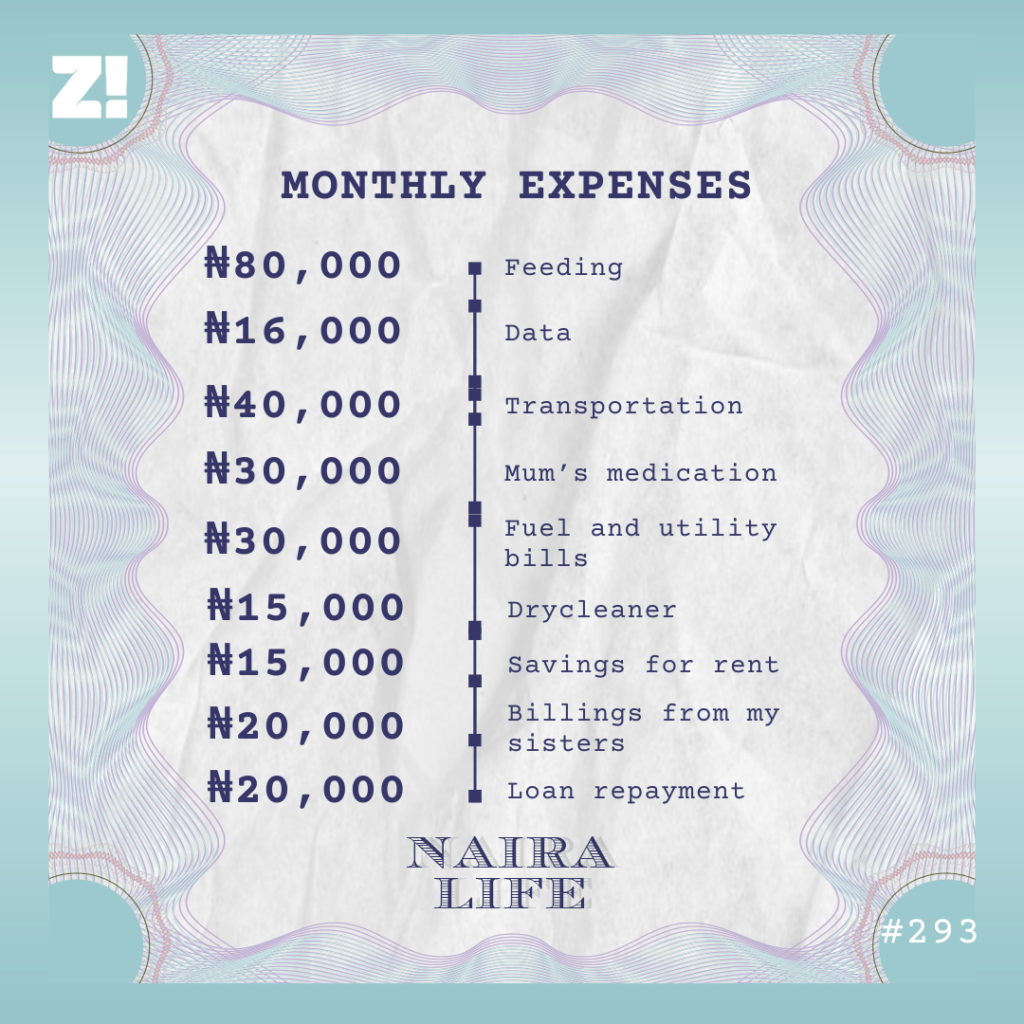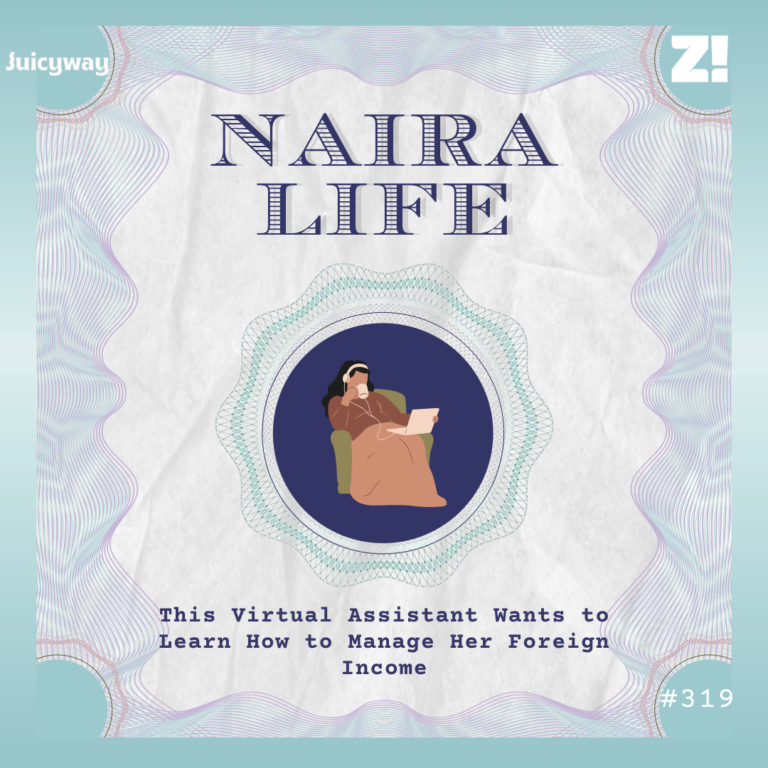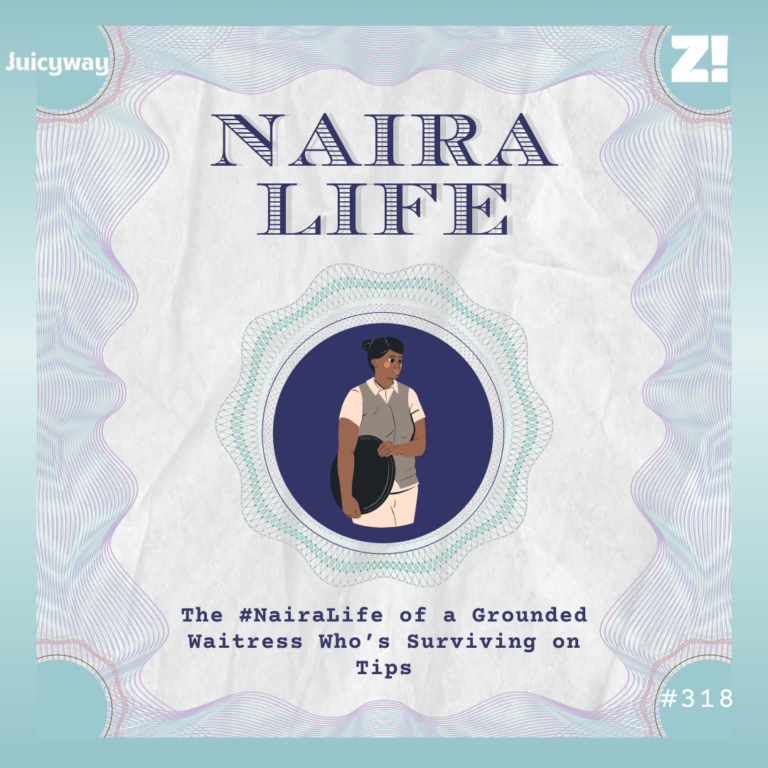Every week, Zikoko seeks to understand how people move the Naira in and out of their lives. Some stories will be struggle-ish, others will be bougie. All the time, it’ll be revealing.

What’s your earliest memory of money?
It was in 2008. I remember it because it was also the first time I saw my dad cry. I was 11 and had returned home from school to find my parents crying in the parlour. Apparently, my dad had lost millions to a scammer who was supposed to facilitate the purchase of some acres of land.
To make things worse, the money was the settlement my dad got from his bank job when the bank folded up earlier that year. So, there was no job and no money. I remember how scared I was that day. The way my parents lamented, I thought it was the end of the world, and hunger would kill us the next day.
You’re here, so it’s safe to say that didn’t happen
But things changed. We moved to a smaller apartment, and my sisters and I transferred to a government school. My dad started a small drycleaning business, and my mum opened a provisions shop to add to what she made at her teaching job.
As the firstborn, I had a bit more “sense”. So, even though I was young, I quickly realised that those random “Daddy, take us to Mr Biggs” requests wouldn’t work again. My younger sisters weren’t as understanding. I remember my sister once crying for two hours because she was tired of eating eba every day. When threats didn’t work, my mum had to beg her to stop crying and just eat.
The whole situation sort of gave me a money-focused mindset. It was simply: Having money equals good, and not having money equals bad. It’s the reason I chose to study medicine at the university. I was a smart student, and all my teachers suggested I should study medicine because of that. But I was pursuing money.
What made you think doctors had money?
The only person who had a car on our street was a doctor. I mean, it made sense to think someone who could afford a car was rich. Plus, my teachers and everyone I told about my medicine aspirations kept talking about how easily doctors found jobs.
So, when I graduated from secondary school in 2012, I decided it was either medicine or nothing. I even forfeited a year because the first uni I applied to gave me microbiology, and I didn’t want that. I decided to use that year to work small while still pursuing admission for medicine.
What kind of work did you do?
Teaching. My mum helped me get a job teaching primary school students at her school. I taught mathematics and got paid ₦15k/month. That was the first time I’d earn anything, and ₦15k felt like ₦1.5m.
I didn’t have to worry about transportation because I followed my mum to work, so I mostly spent my salary on my siblings, as per big brother. My dad made me drop ₦5k at home every month, though. He said it was to teach me responsibility. I didn’t mind.
But damn, I worked hard during that period. I’d teach in the mornings and study all night for JAMB and post-UTME. My efforts eventually paid off — I got admitted for medicine the second time I wrote JAMB and moved on to uni in 2013.
Did you do anything for money while in uni?
Between trying to survive medical school and squatting in different hostels to save on accommodation, I didn’t have the time. My parents gave me a ₦10k monthly allowance, and I billed my aunt and uncle whenever I was broke. That usually brought an additional ₦2k – ₦5k.
Let me tell you something funny. I had the opportunity to write for money in 400 level. A former classmate who’d dropped out to study abroad asked me for help writing a term paper he needed for class. When I sent it to him, he said a few other students would pay if I did the same for them. I refused the offer.
Why?
I thought it’d distract me. I was in the middle of professional exams and was scared of failing. It was better for me to manage what I got from home, focus on school, and graduate to start making medicine money.
By now, though, I already knew “medicine money” wasn’t what I thought it would be. Doctors in private hospitals struggled to survive, and working with the government or very big hospitals was the only way to earn decently. So, my focus shifted to becoming a doctor and working in a government hospital.
Did things go as planned?
At all. After I finished medical school in 2020, the next step was housemanship — the one-year compulsory internship young doctors must undergo before practising. Everyone usually wants to do their housemanship in a government institution or teaching hospital because they pay better and you get more experience.
But placement is very competitive. Someone I know was asked to bring ₦200k so they’d help “work” his placement. I didn’t have that kind of money. Ultimately, I settled for a private hospital that paid ₦80k/month.
Was that good money?
I’m not sure I had time to consider whether it was good or bad. But I worked constantly. The hospital offered me accommodation — a bed in the doctors’ room — and I jumped at it, thinking I was saving money. I soon found out that living at the hospital meant work always came to me, whether I was on duty or not.
Housemanship was the longest year of my life. Once, I was on a 48-hour call and dozed off while clerking a patient. It was wild. The only good thing about that period was how much I saved. I had no time to spend, so I kept my money in my account. Sometimes, I lent my dad money to handle one thing or the other, but I mostly saved. By the time I finished my house job in 2021, I had saved ₦600k.
Nice
I used the money to buy a phone and laptop. I actually didn’t need a laptop; I just thought it was cool to have one. Looking back, I should’ve used the money to rent an apartment. Instead, I returned home to live with my parents.
You say that like it was a bad decision
I don’t know. Maybe things might have happened differently if I’d stopped living at home then. My dad passed away in 2021, and it affected my mum so much that she started having blood pressure issues. The home’s responsibilities automatically fell on me.
Thankfully, my two sisters had graduated from university, so I didn’t have to worry about school fees. But they also lived at home, and I had to step up as the man of the house.
How did you do that without a job?
I began job-hunting like my life depended on it. Forget the scam about doctors not needing to look for jobs because there are always jobs waiting for them. That’s not true. Also, I hadn’t gone for NYSC, and some hospitals wanted the certificate. I honestly saw NYSC as a waste of time. I didn’t understand why I had to spend a whole year earning ₦33k when I could earn more working at a hospital.
At the end of the day, NYSC won. After months of job-hunting and relying on loan apps to feed and support the home, I reluctantly processed my NYSC call-up in 2022. I borrowed ₦35k from a loan app to settle someone at NYSC so I wouldn’t get posted outside my state.
My PPA was a mission hospital that only paid ₦15k/month. Add that to the government’s ₦33k, and I had ₦48k/month. Since the money didn’t go anywhere, I had to turn to loan apps. I borrowed no less than ₦20k every month, sometimes more. All my salary went to repaying loans. I honestly hated it, but I had no choice. I had to transport myself to work, drop money at home for food, buy medication for my mum and still have enough left to pay our ₦250k/year rent.
Sounds tough
I’m still at it, and it’s tough. Sometimes, I struggle with resentment. My sisters now work but don’t drop money at home because they know egbon will handle it. I can’t complain outwardly because it’s my responsibility to be there for them. It just gets difficult, you know?
I finished my service year in 2023 and now work in a hospital that pays ₦200k/month, but I don’t feel like I earn that much. I’m always taking loans because my salary finishes in two weeks, and the crazy interest rates on these loans have kept me in a loan cycle. Just last month, I took a ₦35k loan to fix the generator at home. By the time I’m supposed to pay it back in six months, interest will have pushed the total amount I should repay to ₦47k.
Mad. Can you break down what takes your money in a typical month?

Shey you see I spend more than my salary? This breakdown doesn’t even include the random times I decide to spoil myself by eating out or buying a new pair of trousers. Damn, my finances are really in the mud. Can I tell you something?
Sure
Most of the time, I feel like a threat to my patients because I’m always thinking about money. I’m on autopilot, and my mind isn’t on the work again. I’m constantly brainstorming what extra things I can do to make money, but I always end up at the same conclusion: I can’t do anything else for money as long as I’m practising.
For context, I’m almost always on call at my job. I’m the junior doctor, but the medical director is the only other doctor in the hospital, and he’s always at his government job. So, I work almost 24/7, and it’s extremely dangerous.
The other day, I mistakenly prescribed a dextrose saline infusion to a patient with high blood sugar. Thankfully, the nurse caught that in time. I still don’t know whether to put that mistake on exhaustion or disinterest.
Hmm. Have you considered what you’d do if you weren’t practising?
That’s one reason I regret not taking that writing job seriously in uni. Now, I hear how people earn dollars simply by sitting down in their houses to write. I still remember the lady in this Naira Life who earns close to ₦1m with social media right there in her house.
I’m considering those types of jobs now. I’m currently taking some free online writing and content marketing courses. After that, I’ll look into social media marketing. If I can find a way to get more free time outside the hospital, I also want to explore software development. Right now, I’m open to everything.
It’s not that I want to abandon medicine completely; I spent too many years on it just to abandon the field like that. I only want to make money so I can japa and practise medicine in a sane country that rewards effort. I don’t have actual timelines now, but I know 2028 must not meet me in this country.
What’s an ideal amount you think you should be earning?
In medicine, with my current experience level, maybe ₦400k. But once I get skills in tech and content marketing, maybe ₦600k – ₦800k.
With that, I wouldn’t be as dependent on loans. And I’d have enough to get my own place and put my family on a monthly allowance, so it’s not like I’m just spending and spending as needs arise.
Fair. How would you describe your relationship with money?
Nonexistent. It’s quite clear that I don’t really know what I’m doing. I’m just winging my finances and hoping I get a lucky break soon.
What’s your biggest financial regret?
Taking my first loan from a loan app. I can’t even remember what I took it for, but I wish I never did. Those apps are like bed bugs. It’s tough to get rid of them once you try them once or twice.
What about the last thing you spent money on that made you happy?
I got my mum a dress for her birthday. At ₦50k, it was quite expensive, but the look of gratitude on her face made it worth it.
On a scale of 1-10, how would you rate your financial happiness?
5. I need a lucky break soon before I lose my mind.
If you’re interested in talking about your Naira Life story, this is a good place to start.
Find all the past Naira Life stories here.





